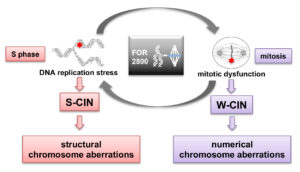Welcome to the homepage of the DFG-funded Research Unit 2800 (FOR2800): Chromosome Instability: „Cross-talk of DNA replication stress and mitotic dysfunction”
The Research Unit 2800 involves the collaborative work from seven laboratories in Göttingen, Kaiserslautern, Duisburg-Essen, Mainz and Koblenz. We have now started our second funding period and we continue to address the scientific question regarding the origin of chromosome instability (CIN), which causes structural as well as numerical chromosome aberrations.

It is well established that CIN and increased levels of chromosome aberrations are closely associated with many human diseases including cancer, neurodegenerative diseases and age-related syndromes and can act as key drivers for disease development and progression. An important cellular condition that causes structural chromosome instability (S-CIN) and leading to structural chromosome aberrations is “replication stress”, which is characterized by a slowed-down or aberrant progression of replication forks during DNA replication in S phase of the cell cycle. On the other hand, errors during mitosis that result in chromosome missegregation are well-known causes of whole chromosome instability (W-CIN) leading to the induction and evolvement of aneuploidy. Since S-CIN and W-CIN are often, if not always, detected concomitantly in various CIN-associated diseases including cancer, the two forms of chromosomal instability might be mechanistically interlinked. In fact, recent evidence indicate that replication stress can promote mitotic chromosome missegregation and aneuploidy. Vice versa, whole chromosome aneuploidy can also contribute to replication stress, thereby establishing a vicious cycle between DNA replication stress and mitotic dysfunction.

The FOR 2800 combines complementary scientific expertise on replication stress, mitotic chromosome segregation, genome instability and aneuploidy to elucidate the mechanistic links between DNA replication stress in S-phase and perturbed chromosome segregation during mitosis and vice versa. The central goal of the research unit 2800 is to define and characterize the molecular mechanisms linking structural and numerical chromosome instability, which are key drivers of human diseases and aging processes.
